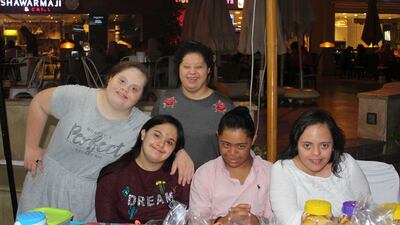In some parts of the Arab world, women with disabilities face limited access to education, employment, medical facilities, an active social life and marriage, particularly in more conservative societies.
In recent years, things have slowly begun to improve, with numerous NGOs, charities and individual efforts focusing on raising awareness and helping people with disabilities integrate further into their communities. The Four Biscuits is one of those efforts and aims to empower young people with Down syndrome by providing them with training in baking and then helping sell their products at local markets and online.
The Egyptian initiative began when the sisters and parents of a group of girls with Down syndrome began organising social activities together, including outings to the cinema, swimming pool and restaurants, as the families believed that their daughters had the right to lead a life like anyone else's. The families also wanted to create a project by them and for them, so initially, they thought about opening a bakery or cafe, where the girls would be the employees. The aim was to further integrate them into society by encouraging direct interaction with the public. But, since the project needed a significant financial investment, the families decided to start small, with a home-based bakery business that would sell its products via social media channels.
The Four Biscuits consists of four girls living with Down syndrome, all of whom attended the same special-needs school, where they met and became friends. The biscuits they sell are based on a special Swiss recipe by Irene Salem, the mother of one of the girls, which proved so popular that the girls and their families decided to make it their signature product. The Swiss biscuits are also now available with a sugar fondant topping, while the newest product is a chocolate-chip cookie, which they launched a few weeks ago.
Although The Four Biscuits started out with four members, one of the girls was forced to drop out when her parents decided to enrol her in a special-needs education centre. To remain true to their name, the remaining members organised an open day in February to find their fourth biscuit. Following a day of fun activities, baking and a large gathering of people with Down syndrome, the team's fourth partner was chosen.
Nada Ahmed, who is the sister of one of the original members and responsible for their public relations, insisted that the "name will remain the same, because it all started with four girls; they are the milestone of the project and they are the real founders". But as the initiative has expanded, it has started recruiting other people suffering from the genetic disorder, regardless of gender, in an attempt to be as inclusive as they want wider society to be.
The three original girls are Sherihane Salem, 21, who loves handicrafts and socialising with friends; Heidi Adel, 20, who enjoys singing, putting on make-up and doing housework; and Seba Ahmed, 21, who is passionate about swimming and photography. The newest member of the team is Mariam, a champion horserider who has taken part in numerous international competitions, and who also works part-time as a teacher at a local NGO.
The Four Biscuits was officially launched in August last year on Facebook and soon started to receive orders. Over a period of 15 months, the group has recognised that it has made "a small difference on a small scale for now". Ahmed adds: "But we need to reach more people, those who do not have the means to attend special schools. We are making a difference regarding the perception of people towards those with disability, and people are so encouraging, so that pushes us forward to continue growing."
________________________
Read more:
Down syndrome residents in UAE defy prejudices to live life with pride
Top UAE swimmer defies doctor who said he would never amount to anything
Dubai special needs volunteer programme requires 'commitment and empathy'
________________________
When asked about the low points of their journey so far, Ahmed was quick to acknowledge that “the lows are worth the highs – when we see the team growing, when we see the bakers getting better and better, when we see people cheering for them … the lows are the typical challenges that face any start-up business. We have challenges, but the boys and girls in the team have so much energy that the lows are rare. Maybe the challenge is when we are overwhelmed with events, orders and people who want to co-operate with us,” she explains. But the Four Biscuits initiative was only made possible thanks to funding from the European Cultural Foundation’s (ECF) Idea Camp, which selected the project from 600 other ideas.
Eventually, it was chosen as one of 50 ideas that would receive both technical and financial support from the ECF for the research and development phase of the project. According to the team, the main message they want to convey is that “disability is an illusion. We all have certain limitations, obstacles and challenges to overcome, but that is because we are simply human; these obstacles gives us the energy to struggle and to fight back, reaching our dreams.” They stress that disability is the creation of society because “we all lack something, so we are all disabled in some way. A chromosome less is just like any other human vulnerability.”


